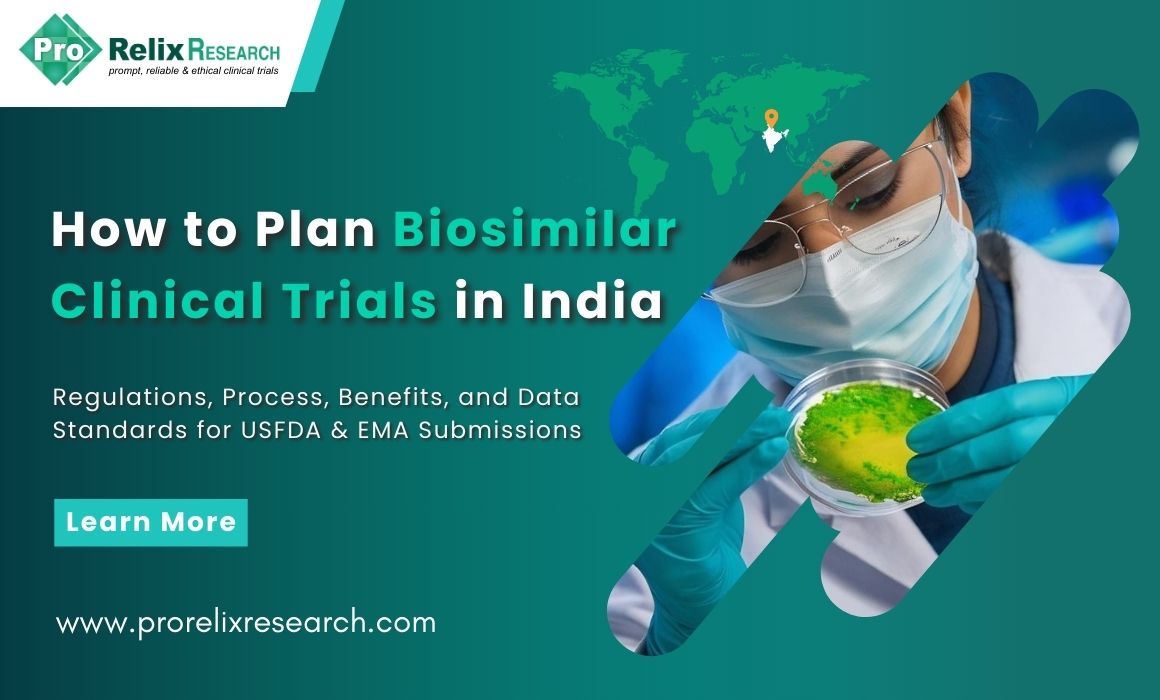Efficient biosimilar clinical trials in India follow regulatory guidelines, structured processes, key benefits, and data standards for USFDA and EMA submissions.
Biosimilar clinical trials in India are witnessing growing global attention amid a significant surge in the development of biosimilars, primarily driven by patent expiries of innovator biologics and rising demand for affordable treatment options. India has emerged as a preferred destination for conducting biosimilar clinical trials, owing to its robust regulatory framework, skilled workforce, and cost-efficiency. This article explores the comprehensive approach to planning biosimilar clinical trials in India, while aligning with global standards for regulatory submissions to the USFDA and EMA.
Regulatory Landscape Governing Biosimilar Clinical Trials in India
India’s biosimilar development is governed by the Central Drugs Standard Control Organization (CDSCO) in collaboration with the Department of Biotechnology (DBT). The regulatory guidance document titled “Guidelines on Similar Biologics: Regulatory Requirements for Marketing Authorization in India” (latest revision: 2016) outlines the scientific and regulatory requirements for biosimilar development, from preclinical to post-marketing phases.
Key components of the Indian regulatory process include:
● Comparability exercises with the reference biologic
● Phased clinical trials: Phase I (PK/PD studies), Phase III (confirmatory efficacy and safety)
● Pre-submission meetings with CDSCO
● Post-approval surveillance (Phase IV studies)
Sponsors must also seek approval from Institutional Ethics Committees (IECs) and register trials on the Clinical Trials Registry – India (CTRI) before initiation.
Strategic Process of Conducting Biosimilar Clinical Trials in India
Planning and executing biosimilar clinical trials in India involves a multilayered approach that integrates scientific rigor with regulatory compliance. The general process includes:
1.Analytical Characterization: Demonstrating structural and functional similarity between the biosimilar and reference product using advanced analytical tools.
2.Non-clinical Studies: Conducting toxicity and pharmacodynamic assessments, often including in vitro and in vivo models.
3.Clinical Development:
Phase I: Pharmacokinetics (PK) and Pharmacodynamics (PD) equivalence studies in healthy volunteers or patients.
Phase III: Large-scale randomized trials to establish clinical efficacy, safety, and immunogenicity compared to the reference biologic.
4.Data Collection and Quality Assurance: Following Good Clinical Practice (GCP) and ICH E6 guidelines to ensure data integrity and reliability.
5.Dossier Preparation: Compiling data into a Common Technical Document (CTD) format for submission.
Benefits of Conducting Biosimilar Clinical Trials in India
India offers multiple strategic advantages for sponsors planning biosimilar development:
- Cost-Effective Trials: Substantially lower operational costs without compromising on quality.
- Diverse Patient Pool: Facilitates rapid recruitment and robust data generation across various indications.
- Regulatory Alignment: Indian guidelines are harmonized with international standards, supporting global submissions.
- Strong Infrastructure: Availability of state-of-the-art clinical research organizations (CROs), bioanalytical labs, and accredited trial sites.
Among the leading CROs in this space, ProRelix Research stands out as a trusted partner offering end-to-end support for biosimilar clinical trials in India. With a strong track record in regulatory submissions, clinical operations, and data management, ProRelix ensures that biosimilar studies adhere to CDSCO, USFDA, and EMA standards. Their expert team and commitment to quality provide biopharmaceutical companies with the confidence to conduct efficient and compliant trials across India.
Implementing Data Standards for USFDA and EMA Submissions
To ensure acceptance by global regulatory agencies such as the United States Food and Drug Administration (USFDA) and the European Medicines Agency (EMA), it is imperative to align trial data with standardized formats:
- CDISC Standards: Adoption of CDISC-compliant formats such as SDTM (Study Data Tabulation Model) and ADaM (Analysis Data Model) is mandatory for USFDA submissions.
- eCTD Format: Both the USFDA and EMA require electronic Common Technical Document (eCTD) submissions, streamlining the review process.
- Data Traceability and Transparency: Ensuring that raw data, metadata, and analysis files are auditable and traceable to original sources enhances regulatory confidence.
Early integration of these standards into clinical trial design significantly reduces the risk of rejections and accelerates approval timelines in the US and EU markets.
Global Biosimilars Market and Future
The global biosimilars market is poised for exponential growth, driven by the increasing demand for cost-effective biologics, the patent expiration of blockbuster biologic drugs, and heightened healthcare accessibility across emerging economies. As biopharmaceutical innovation accelerates, India emerges as a pivotal hub for biosimilar development, offering robust clinical infrastructure, a favorable regulatory framework, and a vast, treatment-naïve patient population. This confluence of factors not only strengthens India’s strategic position in the global biosimilar value chain but also aligns seamlessly with the stringent requirements of international regulatory bodies such as the USFDA and EMA. Consequently, Indian biosimilar clinical trials are increasingly tailored to meet global data standards, positioning Indian sponsors and CROs as critical players in shaping the future of affordable biologic therapies worldwide.
Conclusion
Planning biosimilar clinical trials in India involves strategic coordination between scientific rigor, regulatory foresight, and global data compliance. India’s biosimilar regulatory pathway serves as an entry point for manufacturers seeking to utilize the considerable opportunities within the biologics market. With a favorable regulatory environment, competent infrastructure, and access to high-quality data generation, India continues to attract leading biopharma companies seeking to develop cost-effective and globally acceptable biosimilars. Organizations like ProRelix Research further empower this journey by offering expert-led, end-to-end biosimilar trial services tailored for global success.





